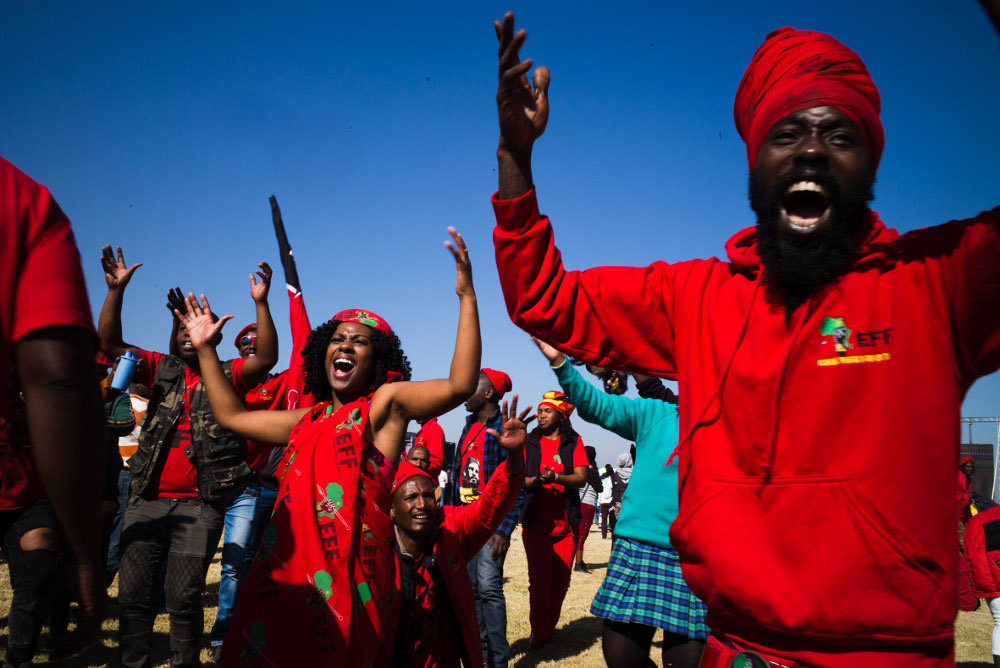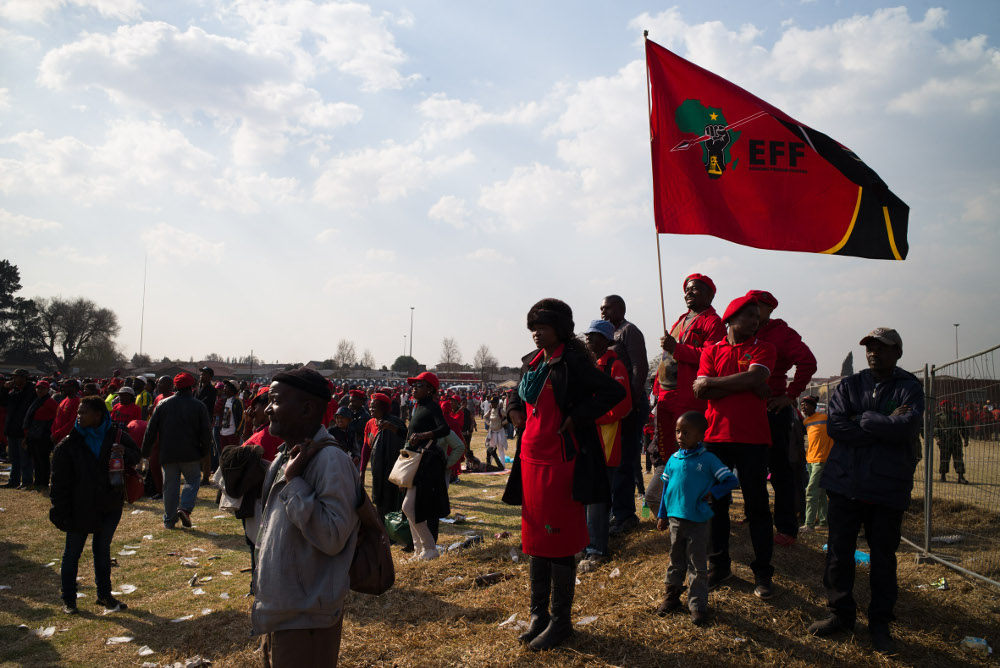Forgotten people: On Youth Day
ANALYSIS
Large rocks block the streets of Boipatong, cordoning off the township from the rest of Gauteng. The makeshift barricades were a community project – a last ditch exercise of political protest after three weeks without electricity.
Every night, residents are forced to gather around street corner pyres, forming tight huddles of winter jackets and bed sheets.
In the last four years, the Economic Freedom Fighters have shown remarkable political cunning in capitalising on this manner of civil unrest. The party, under leader Julius Malema’s watchful eye, has swept through portions of the Vaal, selectively targeting neglected and vulnerable ANC municipalities.
It’s a bold campaign – and one that Malema has no qualms talking about before crowds of thousands.
In a Youth Day address to a sea of red T-shirts and faux military regalia, the leader declared: “We must confront corruption. We must fight corruption. We must defeat corruption.”
“The ANC is a party of black people for white people,” Malema roared, “The EFF is ready to take over!”
The speech lasted nearly an hour, alternating between livid indictments of the ruling party, the legacy of colonialism and President Jacob Zuma. But while the rhetoric was certainly stirring, the backdrop of the ceremony was more indicative of Malema’s skill as a political tactician.
The red berets decided to commemorate those lost in the 1976 Soweto Uprising by visiting Boipatong. As the ANC government organised in the North West province, Malema set his sights on a township on the fringes of Gauteng – with a long and present history of mistreatment.
As party spokesperson Mbuyiseni Ndlozi explained in an interview with TimesLIVE, “[the EFF] chose to come to Boipatong because the ruling party has forgotten the people of this place.”
Malema reiterated his comrade’s sentiments onstage, asserting that ANC leaders – from the local to national level – had betrayed the township and its residents. Zuma was an easy target, but Emfuleni Mayor Simon Mofokeng found himself in the spotlight too after reports surfaced the community leader spent some R1.7-million of public money on KFC and Nando’s.
According to Sithembile Mbete, a political science lecturer at the University of Pretoria, this rage-mongering is not unusual for Malema or his party. In a 2014 treatise published in the Journal of African Elections, Mbete explains: “The EFF has used crisis, breakdown and threat effectively in its political strategy. The party’s official launch was held in Marikana in October 2013. Marikana, the party maintains, symbolises what appears to be an ANC sell out to big capital, its failure to protect the interests of one of its largest labour constituencies, mineworkers, and its susceptibility to the excesses of force that are a feature of authoritarian regimes.

“By choosing to launch its party at the site of the tragedy,” Mbete argues, “the EFF could give impetus to its agenda of being the revolutionary alternative to what it argued was a politically compromised governing party.”
Malema would use similar tactics in January 2014, after protests against poor policing in Relela in Limpopo turned violent. Mbete believes the EFF were able to capitalise on the deaths of three civilians, allegedly shot by police, by campaigning for votes in the aftermath of the tragedy.
Research conducted by Mcebisi Ndletyana, an official at the Mapungubwe Institute for Strategic Reflection (Mistra), illustrates the advantage in practising “grievance politics.”
In Ndletyana’s words: “EFF followers are the disgruntled, unemployed masses who feel left out of the system… poor and unemployed people don’t crack their heads wondering how Malema is going to pay for all the things he has promised them … they just want them.”
This can explain, at least in part, how a fledgling splinter party managed to win support among economically marginalised black youth. However, it fails to illustrate how the EFF was able to secure an average of 10% of the vote in stable working-class communities.
A second study conducted by Ndletyana and his colleagues at Mistra assessed voting trends in South Africa’s national and provincial elections dating back to 1994. The findings show Malema’s radical politics have more resonance than his rhetoric may lead one to believe.
According to Ndletyana, “lack of mobility, the slow pace of economic empowerment and the general prejudice that blacks experience at work places is reportedly stoking resentment … this has possibly softened them to the ‘radical’ options that articulate that discontent. The EFF is one such agent.”
Young, mobile African professionals – those who most consistently face brushes of racism in their offices and varsity classrooms – appear especially susceptible to the Freedom Fighters’ calls for action.
With all this in mind, Malema’s two-pronged campaign takes shape. Between targeting neglected, protest “hotspots” and disillusioned victims of a slow, prejudiced economic system, his party has toed the line between electoral pragmatism and abject rage politics.
In 2014, rural neighbourhoods in Limpopo constituted the backbone of the EFF’s support. More than a quarter of the party’s members were registered in the province. Recently, however, the fighters have turned to poor municipalities throughout Gauteng. There, Malema has access to both the black working class and the Vaal Triangle – comprised of townships with histories of tragedy like Sharpeville and Boipatong alongside old, informal settlements where the need for civic infrastructure and social services is severe.
Today, the EFF holds only 25 seats in the National Assembly. It’s a small opposition bloc, but Malema’s Youth Day speech is only the most recent episode in a series of calculated broadsides into the ANC voting base. As discussed previously in the Mail & Guardian, If the leader’s momentum continues, we could be watching the rise of South Africa’s next kingmaker.
The EFF’s manifesto states the group, “draws inspiration from the broad Marxist-Leninist tradition and Fanonian schools of thought.” It champions the black proletariat, while targeting racist regimes of private capital. The narrative stands at the forefront of every campaign, and it’s resonated particularly with younger audiences.

Brian Makhaya, an 18-year-old who attended the Boipatong Youth Day speech, calls Malema his hero.
“He’s the only one fighting for equal rights. The EFF is the only party that cares about all the government corruption and the kids of South Africa,” Makhaya stated.
Mangaliso Nolusu, 19, echoed similar sentiments: “Zuma is stripping the land. He’s stealing everything he can and the DA is no better. Malema will stop it.”
According to an Ipsos poll conducted in November 2013, 49% of EFF members are under the age of 24, compared to 14% and 30% of members of the DA and ANC, respectively. Malema is playing the long game, hoping his investment in young people and protest-prone, rural strongholds can pay dividends come election season. If he can significantly increase his party’s current 6.35% representation in the National Assembly, the leader may very well ring in a new era of coalition governance.
Going forward, Malema will continue to electrify neglected communities across the country. Whether his concern for their plight is genuine – or merely keen political opportunism – will be shown in time.
In Boipatong, two of the rock barricades were cleared for the EFF address – a pair that separated the main road from the speaking venue. The rest of the barriers stayed in place, though. And days after Malema’s call to action, residents still don’t have power.